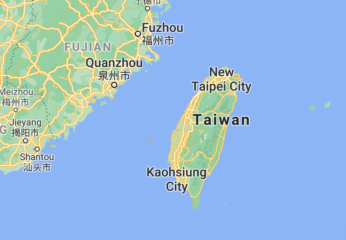In February, as the world was asking Taiwan for help to tackle the semiconductor shortage, the health minister fought with China over COVID-19 vaccines, reported Bloomberg. Three months later, Taiwan is paying the price for a lack of vaccines, with a surge in virus cases that threatens to trigger a lockdown. Only about one percent of its population is vaccinated so far. The situation has the potential to further disrupt the chip industry that dominates the local economy and the industry is critical to an already-squeezed global supply.
Taiwan’s office in New York warned of “logistical problems” and chip shortages without access to more shots. By shunning Chinese vaccines, the government is giving more incentives to larger countries to make investments that may erode Taiwan’s competitive edge in semiconductors, according to Bloomberg.
Separated by a 110 mile-wide strait, Taiwan is regarded as a province by Beijing and its conquest is President Xi Jinping’s key goal for historical and ideological reasons. The U.S. is an ally of Taipei’s democratic government and a big buyer of its exports, dominated by chips produced by Taiwan Semiconductor Manufacturing Co.
The onset late last year of chip shortages looked to give Taipei global leverage. Bloomberg notes that TSMC is the world’s leading provider of cutting-edge semiconductors and holds 56 percent of the so-called foundry business of manufacturing chips designed by customers including Apple Inc. and Qualcomm Inc.
But Taiwan has suffered a sudden reversal of fortunes. Taiwan’s dominance of the market for cutting-edge chips is under attack as governments from the U.S. to Europe and Japan seek to spur production at home.
“I think we’ve become too dependent on Taiwan and Korea, that’s the point, we need a more balanced global supply chain,” Pat Gelsinger, chief executive officer of Silicon Valley’s Intel Corp., the world’s biggest chipmaker, told Bloomberg.
Commerce Secretary Gina Raimondo said this month that while the Biden administration is working with Taipei and TSMC to address the chip shortage, it’s also looking to reduce U.S. dependence on Taiwan. TSMC is in the process of building a new fabrication facility in the U.S.
With the prospect of some $50 billion in government funding to build out chip making in the U.S. and the promise of still more in Europe and South Korea, there are signs that Taiwan is starting to feel the heat. Taiwan can potentially overcome the virus outbreak as well as power and water shortages, showing its companies “can still satisfy global demand by manufacturing mostly in Taiwan without any issue,” said Arisa Liu, a researcher at the Taiwan Institute of Economic Research.
In the short term that will require vaccines, most likely from Europe or the U.S.




Reader Interactions